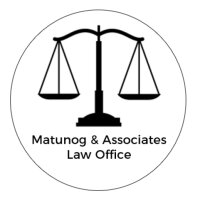Best Communications & Media Law Lawyers in Davao City
Share your needs with us, get contacted by law firms.
Free. Takes 2 min.
List of the best lawyers in Davao City, Philippines
About Communications & Media Law in Davao City, Philippines:
Communications & Media Law in Davao City, Philippines deals with the legal regulations governing the media industry, including newspapers, television, radio, online media, and advertising. These laws aim to protect freedom of speech, regulate content, ensure fair competition, and safeguard the public interest. Understanding these laws is crucial for media professionals, journalists, advertisers, and anyone involved in the communications industry in Davao City.
Why You May Need a Lawyer:
You may need a lawyer specializing in Communications & Media Law in Davao City if:
- You are facing a defamation or libel lawsuit for something published or said.
- You need assistance with obtaining licenses or permits for a media-related business.
- You are involved in a contract dispute with another party in the media industry.
- You require guidance on copyright or intellectual property issues related to media content.
Local Laws Overview:
Key aspects of local laws relevant to Communications & Media Law in Davao City include:
- The Philippine Constitution guarantees freedom of speech and of the press, subject to certain limitations.
- The Kapisanan ng mga Brodkaster ng Pilipinas (KBP) and the Movie and Television Review and Classification Board (MTRCB) regulate content in broadcast media.
- The Intellectual Property Code of the Philippines protects copyright and intellectual property rights in media works.
Frequently Asked Questions:
1. What constitutes defamation in Davao City?
Defamation in Davao City involves making false statements that harm someone's reputation. It can be classified as libel if it is in written form and slander if it is spoken.
2. Can I be sued for sharing news articles on social media?
Sharing news articles on social media generally does not constitute a legal issue. However, if the content is defamatory or infringes on copyright, you could face legal consequences.
3. How can I protect my intellectual property in Davao City?
You can protect your intellectual property in Davao City by registering copyrights for your works, trademarks for your brands, and patents for inventions. Consulting with a lawyer specializing in intellectual property law is advisable.
4. What are the consequences of broadcasting without a license in Davao City?
Operating a broadcast media outlet without a license in Davao City is illegal and can result in fines, penalties, and even imprisonment. It is essential to obtain the necessary permits before engaging in broadcasting activities.
5. How can I respond to a cease and desist letter regarding content I published?
If you receive a cease and desist letter regarding published content, seek legal advice immediately. A lawyer specializing in Communications & Media Law can help you assess the situation and determine the appropriate course of action.
6. What are the restrictions on advertising in Davao City?
Advertising in Davao City is subject to regulations regarding truthfulness, decency, and fairness. Misleading or deceptive advertisements are prohibited, and certain products such as tobacco and alcohol have additional restrictions.
7. Can I be held liable for comments made by users on my website or social media page?
As the owner of a website or social media page, you could potentially be held liable for user-generated content that is defamatory, infringes on intellectual property rights, or violates other laws. Implementing moderation policies and terms of use can help mitigate this risk.
8. What rights do journalists have in protecting their sources in Davao City?
Journalists in Davao City have the right to protect their confidential sources under the Journalists' Shield Law. This legal protection allows journalists to uphold the principle of source confidentiality in their reporting.
9. Can I sue for invasion of privacy in Davao City?
You can sue for invasion of privacy in Davao City if someone unlawfully intrudes into your private affairs, discloses private information, or portrays you in a false light that is highly offensive. Consulting with a lawyer specializing in privacy law is recommended.
10. How can I ensure compliance with Communications & Media Laws in Davao City?
To ensure compliance with Communications & Media Laws in Davao City, it is essential to stay informed about the relevant regulations, seek legal advice when needed, and maintain ethical practices in your media-related activities. Working with a knowledgeable lawyer can help you navigate legal complexities and avoid potential legal pitfalls.
Additional Resources:
For further information and assistance with Communications & Media Law in Davao City, you may consider reaching out to the following resources:
- Integrated Bar of the Philippines - Davao Chapter
- Philippine Press Institute (PPI)
- Advertising Standards Council (ASC) Philippines
- Intellectual Property Office of the Philippines (IPOPHL)
Next Steps:
If you require legal assistance in Communications & Media Law in Davao City, it is advisable to consult with a lawyer specializing in this field. They can provide you with personalized advice and representation to help address your specific legal needs. Be proactive in seeking legal guidance to protect your rights and navigate the complexities of Communications & Media Law in Davao City, Philippines.
Lawzana helps you find the best lawyers and law firms in Davao City through a curated and pre-screened list of qualified legal professionals. Our platform offers rankings and detailed profiles of attorneys and law firms, allowing you to compare based on practice areas, including Communications & Media Law, experience, and client feedback.
Each profile includes a description of the firm's areas of practice, client reviews, team members and partners, year of establishment, spoken languages, office locations, contact information, social media presence, and any published articles or resources. Most firms on our platform speak English and are experienced in both local and international legal matters.
Get a quote from top-rated law firms in Davao City, Philippines — quickly, securely, and without unnecessary hassle.
Disclaimer:
The information provided on this page is for general informational purposes only and does not constitute legal advice. While we strive to ensure the accuracy and relevance of the content, legal information may change over time, and interpretations of the law can vary. You should always consult with a qualified legal professional for advice specific to your situation.
We disclaim all liability for actions taken or not taken based on the content of this page. If you believe any information is incorrect or outdated, please contact us, and we will review and update it where appropriate.









